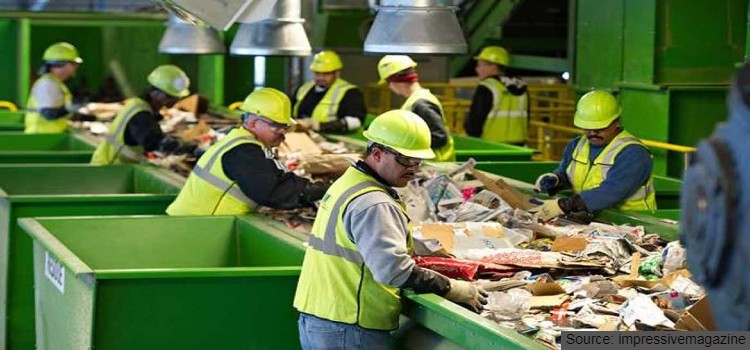
Canada Waste Management Market by Waste Type (Municipal Solid Waste (MSW) or Household, Industrial, and Commercial) and by Waste Treatment (Composting, Incineration, Controlled Landfill, Uncontrolled Landfill, Sanitary Landfill, Open Dump, and Recycling)– Opportunity Analysis and Industry Forecast, 2024 – 2030
Industry: Energy & Power | Publish Date: 07-Oct-2024 | No of Pages: 114 | No. of Tables: 82 | No. of Figures: 47 | Format: PDF | Report Code : EP1243
Canada Waste Management Market Overview
The Canada Waste Management Market size was valued at USD 37.02 billion in 2023, and is predicted to reach USD 64.22 billion by 2030, at a CAGR of 7.10% from 2024 to 2030. Waste management involves a wide range of services and activities aimed at managing and mitigating the impact of waste generated by various sectors including residential, commercial, industrial, and healthcare. It includes the collection, transportation, processing, recycling, and disposal of waste materials in a manner that is environmentally responsible and sustainable.
The market for waste treatment also involves the development and implementation of technologies and practices that promote waste reduction, resource recovery, and the safe handling of hazardous materials.
Key components of the waste management sector include waste collection services, recycling facilities, waste-to-energy plants, landfill operations, and environmental consulting services.
As awareness of environmental issues grows, the Canada waste management market continues to expand, driven by growing population, technological advancements, and increasing public demand for sustainable waste solutions.
Increase in Waste Generation Across the Country Fuels the Canada Waste Management Market Growth
The increase in waste generation across the country fuels the growth of the waste management market in Canada. As both residential and industrial waste volumes rise, there is a growing need for effective waste treatment solutions to handle and process this increased waste.
As per the Government of Canada, the plastic waste in Canada accounted for 4 million tonnes in 2023 as compared to 3.5 million tonnes in 2018, an increase of 14.3% in the span of 5 years. This surge in waste generation drives demand for advanced waste collection technologies and services, leading to the Canada waste management market expansion and the development of more efficient waste handling practices.
Government Initiatives Towards Waste Management Solutions Propel the Market Expansion in Canada
The government initiatives are further driving the Canada waste management market expansion by advancing sustainable waste collection practices and supporting infrastructure development.
For example, in 2019, the key federal organizations led by Environment and Climate Change Canada launched the Zero Plastic Waste Horizontal Initiative, aiming to keep plastics in use within the economy and out of the environment by 2030.
Government actions, such as introducing stricter regulations and providing financial support for waste collection projects, stimulate innovation and efficiency within the industry, further accelerating the market growth in Canada.
Complex And Costly Waste Management Solutions Hinders the Marker Growth
The vast and sparsely populated areas of the country make waste collection and management more complex and costly. The low population density and extensive geographic spread significantly contribute to higher logistical challenges and increased expenses for transporting and processing waste.
In regions where communities are dispersed across large areas, the infrastructure needed to support efficient waste management is underdeveloped or lacking altogether. This results in significant obstacles for waste collection companies tasked with collecting, transporting, and processing waste across such vast distances in Canada.
The Adoption of Waste-To-Energy Technologies Creates Future Growth Opportunities in the Market
The adoption of waste-to-energy technologies such as incineration, anaerobic digestion, and gasification presents a significant growth opportunity for the waste management market as these technologies convert waste materials into usable energy, reducing landfill dependency and contributing to sustainable energy generation.
By transforming waste into a valuable resource, waste-to-energy solutions promote environmental sustainability and drive the Canada waste management market demand. This innovative approach aligns with global trends toward circular economy practices and offers economic benefits by generating energy from waste that creates a promising avenue for growth of the waste collection sector.
Competitive Landscape
The promising players operating in Canada waste management industry includes Waste Management, Inc., GFL Environmental, PyroGenesis Canada Inc., Li-Cycle Holdings Corp., Veolia Environnement S.A., Republic Services, Waste Connections of Canada Inc., Clean Harbors, GFL Environmental, Radius Recycling, Inc., and others.
Canada Waste Management Market Key Segments
By Waste Type
-
Municipal Solid Waste (MSW) or Household
-
Food
-
Paper and Cardboard
-
Plastic
-
Glass
-
Metal
-
Others
-
-
Industrial
-
Manufacturing Waste
-
Construction & Demolition Waste
-
Agriculture Waste
-
Other Industrial waste
-
-
Commercial
By Waste Treatment
-
Composting
-
Incineration
-
Controlled Landfill
-
Uncontrolled Landfill
-
Sanitary Landfill
-
Open Dump
-
Recycling
Key Players
-
Waste Management, Inc.
-
GFL Environmental
-
PyroGenesis Canada Inc.
-
Li-Cycle Holdings Corp.
-
Veolia Environnement S.A.
-
Republic Services
-
Waste Connections of Canada Inc.
-
Clean Harbors
-
GFL Environmental
-
Radius Recycling, Inc.
REPORT SCOPE AND SEGMENTATION:
|
Parameters |
Details |
|
Market Size Value in 2023 |
USD 37.02 billion |
|
Revenue Forecast in 2030 |
USD 64.22 billion |
|
Value Growth Rate |
CAGR of 7.10% from 2024 to 2030 |
|
Analysis Period |
2023–2030 |
|
Base Year Considered |
2023 |
|
Forecast Period |
2024–2030 |
|
Market Size Estimation |
Billion (USD) |
|
Growth Factors |
|
|
Companies Profiled |
10 |
|
Customization Scope |
Free customization (equivalent up to 80 working hours of analysts) after purchase. Addition or alteration to country, regional, and segment scope. |
|
Pricing and Purchase Options |
Avail customized purchase options to meet your exact research needs. |




 Speak to Our Analyst
Speak to Our Analyst
































